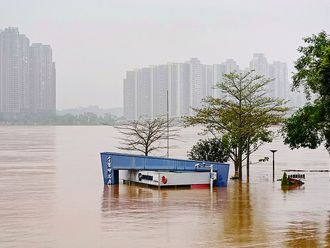Kabul: Afghan businessmen vowed yesterday to stop doing business with neighbouring Iran until it stops blocking thousands of fuel trucks from crossing into Afghanistan — a blockade that has caused fuel prices to spike.
The Iranians began barring fuel trucks from crossing the Iran-Afghanistan border in late December, leaving about 2,500 trucks stuck at three crossings. The move, which Afghan officials have criticised as being tantamount to an embargo, has led wholesale domestic fuel prices to rise as much as 70 per cent.
The blockade, now in its fourth week, has prompted protests in Kabul and in Herat province, which borders Iran.
The complaints commission of the Afghan parliament's upper house on Monday strongly condemned Iranian interference in Afghanistan. An Afghan political party has collected more than 200,000 signatures and fingerprints of angry Kabul residents on a petition protesting the fuel truck blockade. Iran supplies about 30 per cent of the country's refined fuel, Afghan officials say. The remainder of the blocked shipments of vehicle and heating fuel comes from Iraq and Turkmenistan and is only transiting Iran, they say.
Tehran has said the ban was linked to its recent decision to slash domestic fuel subsidies to cut costs and boost an economy squeezed by international sanctions. Afghan officials say Iran has also told them it is concerned the shipments are destined for Nato forces in Afghanistan, but Afghan and Nato officials deny that.
"This fuel doesn't belong to Nato, it belongs to the poor Afghan people," Farid Shirzai, head of the Afghan Commerce Ministry's fuel department, said yesterday.
He said Iran allowed about 40 tanker trucks to cross the border at three crossings on Monday.
Petition
Najibullah Kabuli, a former member of the Afghan parliament from Kabul and leader of the National Participation Party, said he submitted the 300 metre-long petition from Kabul residents upset about Iranian interference in Afghanistan to the UN office in Kabul on Monday.
"Iran is stopping all the fuel tankers at its border and not letting them come into Afghanistan. This is hurting Afghan businessmen, costing them millions of dollars," Kabuli said.
About 60 businessmen, members of the Afghan Chamber of Commerce gathered yesterday to pledge to stop doing business with Iran.












